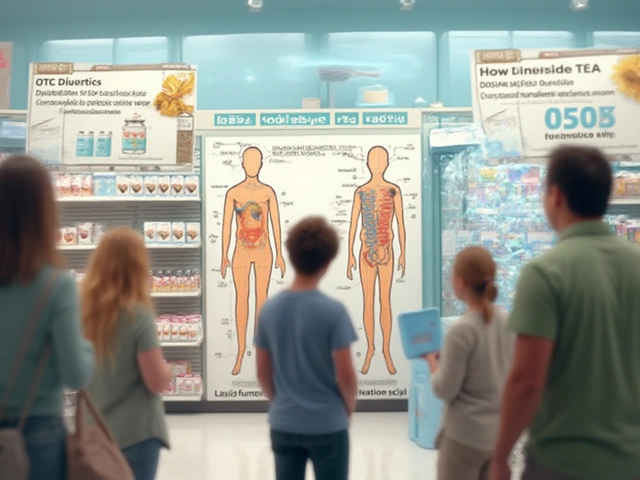Understanding Major Depressive Disorder and Eating Disorders
Major Depressive Disorder (MDD) and eating disorders are two distinct mental health conditions that can profoundly impact a person's life. Although they are different in nature, they often share certain characteristics and are frequently seen together in individuals. In this article, we will explore the connection between Major Depressive Disorder and eating disorders, delving into the reasons they often co-occur and the implications of this relationship for treatment and recovery.
The Impact of Depression on Eating Habits
Depression can significantly affect an individual's eating habits, often leading to changes in appetite and weight. Some people with MDD may experience a decreased appetite, causing them to eat less and potentially lose weight. Others may experience an increased appetite, often leading to weight gain. In either case, these changes in eating habits can be a contributing factor to the development of an eating disorder.
Emotional Eating and Binge Eating
For many individuals struggling with MDD, food can become a source of comfort and a way to cope with overwhelming emotions. Emotional eating can result in overeating, and in some cases, binge eating episodes. Binge eating is characterized by consuming a large amount of food in a short period of time while feeling a loss of control. This behavior can be a precursor to the development of binge eating disorder or bulimia nervosa.
The Role of Body Image and Self-Esteem in the Connection between MDD and Eating Disorders
Body image and self-esteem issues are common among individuals with both MDD and eating disorders. People with depression often have negative thoughts about themselves and their bodies, which can contribute to the development of an unhealthy relationship with food. Low self-esteem can lead to feelings of worthlessness and a belief that one's appearance is the cause of their unhappiness. These thoughts can fuel disordered eating behaviors, such as restrictive dieting, binge eating, or purging.
Perfectionism and the Drive for Thinness
Perfectionism is another trait that is often seen in individuals with both MDD and eating disorders. The drive for thinness, in particular, can be a manifestation of perfectionism in the context of an eating disorder. People with MDD may feel that achieving the "perfect" body will alleviate their depression and improve their lives. This belief can lead to the development of anorexia nervosa or other disordered eating behaviors.
Biological Factors Contributing to the Co-occurrence of MDD and Eating Disorders
Research has shown that there are biological factors that may contribute to the development of both Major Depressive Disorder and eating disorders. One such factor is the dysregulation of neurotransmitters, such as serotonin and dopamine, which play a role in mood regulation and appetite control. Imbalances in these neurotransmitters can contribute to the development of depression, and may also play a role in disordered eating behaviors.
Genetic Vulnerability
Genetic factors can also contribute to the co-occurrence of MDD and eating disorders. Studies have found that individuals with a family history of depression are at an increased risk of developing an eating disorder, and vice versa. This suggests that there may be shared genetic vulnerabilities that contribute to the development of both conditions.
The Importance of Integrated Treatment for Co-occurring MDD and Eating Disorders
When an individual is struggling with both Major Depressive Disorder and an eating disorder, it is important that they receive integrated treatment that addresses both conditions simultaneously. Treating one condition without addressing the other can lead to a higher likelihood of relapse and a longer recovery process. Integrated treatment typically involves a combination of therapy, medication, and support from a multidisciplinary team of professionals.
Therapeutic Approaches for Co-occurring MDD and Eating Disorders
There are various therapeutic approaches that can be effective for treating co-occurring MDD and eating disorders. Cognitive Behavioral Therapy (CBT) is one such approach that has been shown to be effective in treating both conditions. CBT focuses on identifying and challenging negative thought patterns and behaviors, and can help individuals develop healthier coping strategies for managing their depression and disordered eating. Other therapeutic approaches that may be beneficial include Dialectical Behavior Therapy (DBT), Interpersonal Therapy (IPT), and Family-Based Therapy (FBT).
Conclusion
The connection between Major Depressive Disorder and eating disorders is complex and multifaceted. Understanding this relationship is crucial for providing effective treatment and support for individuals struggling with these conditions. By addressing the underlying factors contributing to the co-occurrence of depression and disordered eating, individuals can work towards recovery and improved mental health.




17 Comments
Alan Whittaker
It's evident that the prevailing psychiatric establishment is deliberately obfuscating the neurochemical interplay between depressive syndromes and anorexic pathology, leveraging DSM codifications as a strategic veneer. Their reliance on serotonergic dysregulation hypotheses serves as a convenient scaffold for pharmaceutical monopolies to perpetuate market dominance. By cherry‑picking correlational data, they mask the ontogenetic convergence of affective and alimentary dysfunctions. The covert agenda becomes clear when one scrutinizes the funding pipelines that funnel industry cash into so‑called "integrated treatment" research.
Michael Waddington
Look, the article nails the basics but it kinda skims over how binge‑eating can actually be a misguided self‑medication tactic. When you're down, the brain craves quick dopamine spikes, and food is the cheap fix. Therapists should flag that pattern early before it spirals.
HAMZA JAAN
Honestly, reading that "basic" overview feels like watching a toddler re‑enact a Shakespeare tragedy. The whole "depression leads to binge eating" line is oversimplified to the point of tragedy. It's not just a mood swing; it's a systemic collapse of coping mechanisms that most people can't even fathom.
M Black
Wow this is super important! 😊 Remember folks, it's all about small wins – even a short walk can boost mood and curb cravings 😃 Stay positive keep pushing forward
Sidney Wachira
Drama alert 🚨: Did you know that the “integrated treatment” hype is basically a buzzword to sell more therapy packages? 🎭 People think it’s a miracle cure, but it’s often just a rerun of CBT with a fancy label. Don’t be fooled!
Aditya Satria
While the enthusiasm for integrated approaches is commendable, it is essential to maintain clear therapeutic boundaries and evidence‑based practices. Combining CBT with DBT should be guided by rigorous outcome data, not merely by trend. Moreover, clinicians must continually assess for adverse effects when pharmacotherapy is introduced alongside psychotherapy.
Jocelyn Hansen
Great summary!!! It's so encouraging to see the emphasis on holistic care, and I love how the article highlights the role of supportive networks. Keep spreading the word; every voice matters!!! 😊😊😊
Joanne Myers
Thank you for the concise overview; the link between affective dysregulation and maladaptive eating behaviours is clearly articulated.
rahul s
Only thing missing is a shout‑out to the power of national resilience.
Julie Sook-Man Chan
I appreciate the thoroughness of this piece, though I would have liked a quieter tone for such a sensitive subject.
Amanda Mooney
Excellent article! It strikes a perfect balance between scientific rigor and compassionate insight, and I commend the authors for their thoroughness.
Mandie Scrivens
Oh, great, another “comprehensive” guide that pretends to be original while re‑hashing textbook definitions. Very original, truly.
Natasha Beynon
Your emphasis on collaborative, multidisciplinary care is absolutely spot‑on; fostering a respectful therapeutic alliance can make all the difference for those battling both depression and disordered eating.
Cinder Rothschild
When we delve into the intertwined neurobiology of mood regulation and appetite control, we encounter a tapestry of neurotransmitter pathways that defy simplistic categorisation. Serotonin, for instance, not only modulates affective states but also orchestrates satiety signals within the hypothalamus. Dopaminergic circuits, meanwhile, reward both social interaction and the consummatory pleasure of food, creating a feedback loop that can become pathological under chronic stress.
Furthermore, epigenetic modifications induced by early‑life adversity can sensitize these systems, predisposing individuals to both depressive episodes and maladaptive eating patterns. This bidirectional vulnerability underscores the necessity of integrated therapeutic frameworks that address the psychophysiological underpinnings rather than treating symptoms in isolation.
In practice, this might involve synchronising pharmacological agents that target serotonergic dysregulation with psychotherapeutic modalities like CBT‑E, which explicitly links emotional triggers to eating behaviours. By aligning treatment targets across the mind‑body axis, clinicians can hope to restore homeostasis and break the pernicious cycle of depression‑induced dysphoria and compensatory overeating.
Oscar Brown
It is a matter of profound philosophical import to recognise that the co‑occurrence of major depressive disorder and eating disorders is not a mere statistical coincidence but a manifestation of the dialectic tension between the self's ontological yearning for wholeness and the existential fragmentation engendered by contemporary sociocultural pressures.
The phenomenological experience of depression, characterised by an affective lowness and anhedonia, can be interpreted as a loss of meaning, a void that the psyche seeks to fill through corporeal means.
Consequently, the act of eating-particularly compulsive or restrictive patterns-transcends the realm of nutritive function and becomes a symbolic gesture, an attempt to re‑assert agency over a body that feels otherwise alienated.
Neurobiologically, the dysregulation of serotonergic pathways reflects this ontological dissonance; serotonin, the neurotransmitter historically linked to mood modulation, also partakes in the regulation of appetite, thereby providing a biophysical substrate for the observed comorbidity.
Moreover, the dopamine reward circuitry, when depleted in depressive states, prompts compensatory behaviours that seek artificial spikes of pleasure, often manifested in binge episodes.
From a therapeutic standpoint, this necessitates an integrative approach that addresses both the subjective narrative and the underlying neurochemical derangements.
Cognitive‑behavioral strategies must therefore be coupled with pharmacotherapy that normalises serotonergic transmission, while also incorporating dialectical techniques that foster acceptance of bodily experience.
Interpersonal therapy, by elucidating relational deficits, can alleviate the sense of isolation that fuels both depressive rumination and maladaptive eating.
Family‑based interventions further provide a systemic context, acknowledging that the individual’s pathology is situated within a network of relational dynamics.
The literature consistently demonstrates that when treatment remains siloed-addressing depression without attending to eating pathology, or vice versa-the risk of relapse escalates dramatically.
It is therefore incumbent upon clinicians to conceive of the patient as an integrated whole, wherein mood and eating behaviours are conceived as interdependent facets of a singular phenomenological field.
In summation, the intricate interplay between affective dysregulation and disordered eating demands a multidimensional therapeutic schema, one that honors both the existential longing for meaning and the physiological exigencies of the body.
Only through such a holistic paradigm can we hope to ameliorate the profound distress experienced by those ensnared in this dual affliction.
Tommy Mains
In simple terms, if you’re feeling low and you start using food as a quick fix, that’s a sign you need help on both fronts. Talk therapy can give you new tools, and medication can level out the brain chemistry. It’s best to have a doctor who looks at the whole picture, not just one piece.
Alex Feseto
Whilst the treatise furnishes a comprehensive exegesis of the interrelationship between affective disturbances and alimentary dysregulation, one must remain vigilant against the proclivity for over‑intellectualisation that can obfuscate pragmatic clinical application.